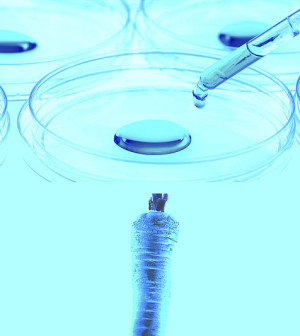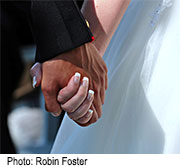- The Best Time of Day to Drink Bone Broth to Maximize Health Benefits
- 8 Ways to Increase Dopamine Naturally
- 7 Best Breads for Maintaining Stable Blood Sugar
- Gelatin vs. Collagen: Which is Best for Skin, Nails, and Joints?
- The Long-Term Effects of Daily Turmeric Supplements on Liver Health
- Could Your Grocery Store Meat Be Causing Recurring UTIs?
- Are You Making This Expensive Thermostat Error This Winter?
- Recognizing the Signs of Hypothyroidism
- 10 Strategies to Overcome Insomnia
- Could Artificial Sweeteners Be Aging the Brain Faster?
Saying ‘I Do’ Because of Similar DNA?


Married couples typically have a lot in common, and researchers now say that may extend to their genes.
Spouses tend to be more genetically similar than two people chosen off the street at random, according to a new study.
It’s likely this is because people who are genetically similar have more opportunities to meet and mate — in other words, “birds of a feather flock together,” said lead author Benjamin Domingue, a research associate at the University of Colorado-Boulder’s Institute of Behavioral Science.
“Genes drive so many things that can structure opportunities and outcomes that determine who we mate,” Domingue said. For example, genes may determine whether your potential partner shares your height or weight, or your ethnic background, religion or level of education.
Domingue and his colleagues examined the genetics of 825 white heterosexual American married couples, comparing 1.7 million potential points of genetic similarity.
The results, published May 19 in the Proceedings of the National Academy of Sciences, found that spouses share a significant number of genetic similarities, compared to any two random individuals.
This conclusion could end up changing the statistical models scientists use to understand genetic differences between human populations, because such models often assume random mating, the researchers said.
The similarity between married folks is not nearly as deep as that between siblings, though.
“Siblings share on average about half their genes, and even within siblings there is variation on that between 40 percent to 60 percent,” Domingue said. “The ranges we’re looking at between a married couple are much, much smaller, but you do see that spouses share similarities.”
The tendency to marry someone genetically similar also is slimmer than the tendency to marry someone with a similar level of education. Genetic similarity between spouses carries about one-third the strength of educational similarity, the researchers report.
Married couples likely have similar genetic traits because their genes helped determine whom they would meet during their lives, Domingue said.
“People with more similar genes end up having similar education, which places them in the same social situations and gives them a better chance to mate,” he said.
People also tend to marry those similar to themselves in terms of race, ethnicity and even body size and shape. Genes may also shape even more subtle biological distinctions that draw people together in ways we don’t yet understand, Domingue added.
At least one expert is skeptical of the researchers’ conclusions.
Since these life circumstances play a large role in determining lifelong partners, it may be misleading to say people choose spouses based on genetic similarity, said Neil Risch, director of the Center for Human Genetics at the University of California, San Francisco.
“This [study] seems to suggest that mate choice is based on genes. The genes are, in a sense, a bystander,” said Risch, who is also president-elect of the American Society of Human Genetics.
“Historically, in a highly ethnically and geographically structured population, say Chicago, it might have been the case that Eastern Europeans only married other Eastern Europeans, Southern Europeans only married Southern Europeans, and Northern Europeans only married Northern Europeans,” he continued.
“This would lead to significant correlations for genetic factors differentiating these ethnic groups, but has nothing to do with any traits or characteristics which underlie mate choice,” he said. “It may be simply more an issue of local geography.”
More information
For more information on human genetics, visit the U.S. National Institutes of Health.
Source: HealthDay
Copyright © 2026 HealthDay. All rights reserved.










